广西南宁市马山县2017_2018学年高一英语上学期期中试题
2017-2018学年高一英语上学期期中试题_14
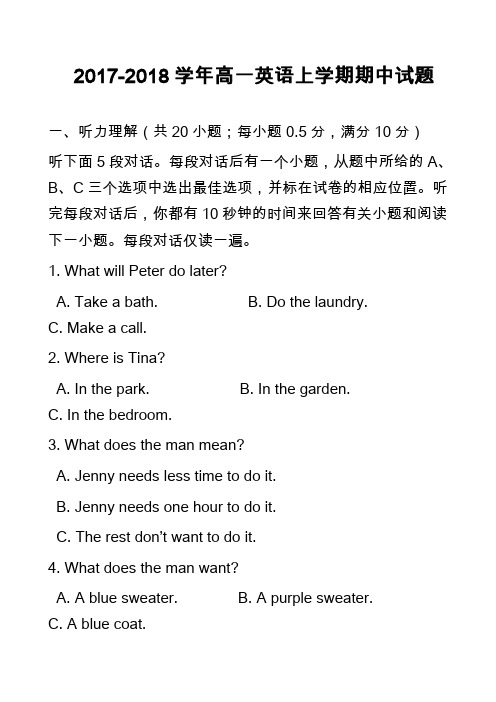
第一节:阅读下列短文,从每题所给的四个选项(A、B、C、和D)中,选出最佳选项,并在答题卡上将该项涂黑。
A
When you think of a typical American, whom do you picture? A pretty blond white American like Taylor Swift? Or a handsome black American like President Barack Obama or basketball star Kobe Bryant? In fact, there was a time when the average American lookedlike none of these people.
听第10段材料,回答第17至20题。
17. Where did Tomas leave his car?
A. Near a square. B. At a parking place. C. In a narrow street.
18. When did Tomas arrive?
A. At 4:20. B. At 4:40. C. At 5:00.
B. Jenny needs one hour to do it.
C. The rest don’t want to do it.
4. What does the man want?
A. A blue sweater. B. A purple sweater. C. A blue coat.
5. What does the man advise the woman to do?
9. When did the woman start her work today?
2017-2018学年上学期高一英语期中考试卷
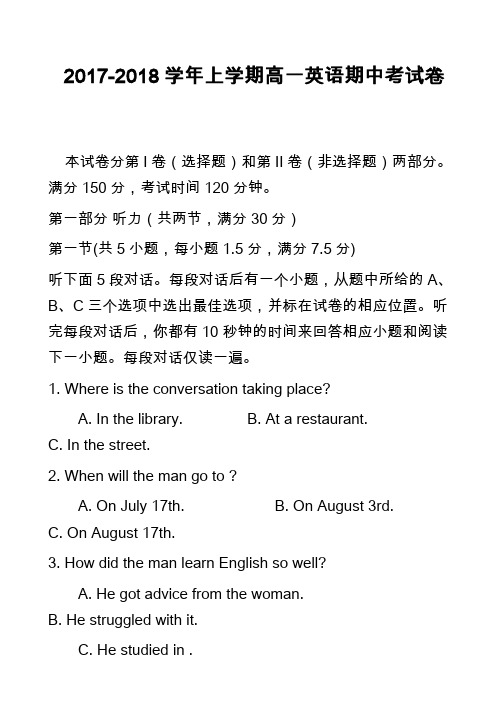
2017-2018学年上学期高一英语期中考试卷本试卷分第I卷(选择题)和第II卷(非选择题)两部分。
满分150分,考试时间120分钟。
第一部分听力(共两节,满分30分)第一节(共5小题,每小题1.5分,满分7.5分)听下面5段对话。
每段对话后有一个小题,从题中所给的A、B、C三个选项中选出最佳选项,并标在试卷的相应位置。
听完每段对话后,你都有10 秒钟的时间来回答相应小题和阅读下一小题。
每段对话仅读一遍。
1. Where is the conversation taking place?A. In the library.B. At a restaurant.C. In the street.2. When will the man go to ?A. On July 17th.B. On August 3rd.C. On August 17th.3. How did the man learn English so well?A. He got advice from the woman.B. He struggled with it.C. He studied in .4. Why does the woman refuse the popcorn at the cinema?A. It’s too salty.B. It’s too sweet.C. It’s too expensive.5. What music is George listening to?A. The Beatles.B. Jazz.C. Country music.第二节(共15小题;每小题1.5分,满分22.5分)听下面5段对话或独白,每段对话或独白后有几个小题,从题中所给的A、B、C三个选项中选出最佳选项,并标在试卷的相应位置。
听每段对话或独白前,你将有时间阅读各个小题,每小题5秒钟;听完后,各小题将给出5秒钟的作答时间。
广西桂林市高一英语上学期期中试题(new)

2017—2018学年上学期高一年级段考英语科试卷第I卷(选择题,共三部分,满分90分)第一部分:听力理解(共两节,满分30分)第一节(共5小题;每小题1。
5分,满分7。
5分)听下面5段对话。
每段对话后有一个小题,从题中所给的A、B、C三个选项中选出最佳选项,并把答案写在答题卡上相应位置。
听完每段对话后,你都有10秒钟的时间来回答有关小题和阅读下一小题。
每段对话仅读一遍。
1.When will the speakers meet?A.After the test。
B.Today after school。
C.On Friday after class.2.Who will have a party this weekend?A.The woman’s roommate.B.The man’s friend。
C.The woman。
3.What did the man do before lunch?A.He cleaned the car.B.He had a picnic.C.He visited his friends.4.Where does the woman want to have a picnic?A.By the lake。
B. In the mountains。
C. In her backyard (后院).5.What does the woman mean?A.The man should quit his job。
B.It’s unfair to the man.C.The man is lying.第二节(共15小题;每小题1。
5分,满分22。
5分)听下面5段对话或独白.每段对话或独白后有几个小题,从题中所给的A、B、C三个选项中选出最佳选项,并把答案写在答题卡上相应位置。
听每段对话或独白前,你将有时间阅读各个小题,每小题5秒钟;听完后,各小题将给出5秒钟的作答时间。
每段对话或独白读两遍。
2017-2018学年高一英语上学期期中试题_80

2017-2018学年高一英语上学期期中试题本试卷分第I卷(选择题)和第II卷(非选择题)两部分,共150分。
第I卷第一部分:听力(共两节,满分20分)第一节(共5小题;每小题1分,满分5分)听下面五段对话。
每段对话后有一个小题,从题中所给的A、B、C三个选项中选出最佳选项,并标在试卷的相应位置。
听完每段对话后,你都有10秒钟的时间来回答有关小题和阅读下一小题。
每段对话仅读一遍。
When will the gym open?A. At 7:00 a.m.B. At 7:30 a.m.C. At 8:00 a.m.What does the woman think about the weather on Saturday?A. Warm and sunny.B. Sunny but windy.C. Windy a nd cold.Where does the conversation most probably take place?A. At the train station.B. At the airport.C. At the bus station.What will Elizabeth do in Paris?A. To meet Patrick.B. For her holiday.C. To p ick up Patrick.What’s the possible relationship between the two speakers?A. Strangers.B. Neighbors.C. Friends.第二节(共15题;每小题1分,满分15分)听下面五段对话或独白。
每段对话或独白后有几个小题,从题中所给的A、B、C三个选项中选出最佳选项,并标在试卷的相应位置。
听每段对话或独白前,你将有时间阅读各个小题,每小题5秒钟;听完后,各小题将给出5秒钟的作答时间。
每段对话或独白读两遍。
2017-2018学年高一上学期期中考试(11月)英语试题
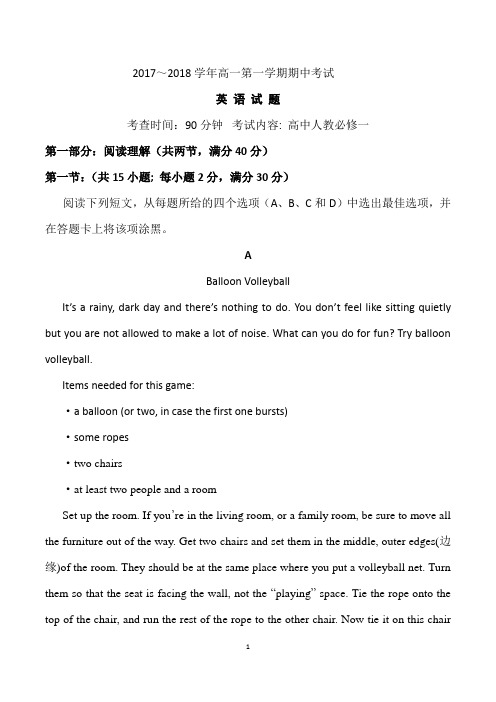
2017~2018学年高一第一学期期中考试英语试题考查时间:90分钟考试内容: 高中人教必修一第一部分:阅读理解(共两节,满分40分)第一节:(共15小题; 每小题2分,满分30分)阅读下列短文,从每题所给的四个选项(A、B、C和D)中选出最佳选项,并在答题卡上将该项涂黑。
ABalloon VolleyballIt’s a rainy, dark day and there’s nothing to do. You don’t feel like sitting quietly but you are not allowed to make a lot of noise. What can you do for fun? Try balloon volleyball.Items needed for this game:·a balloon (or two, in case the first one bursts)·some ropes·two chairs·at least two people and a roomSet up the room. If you’re in the living room, or a family room, be sure to move all the furniture out of the way. Get two chairs and set them in the middle, outer edges(边缘)of the room. They should be at the same place where you put a volleyball net. Turn them so that the seat is facing the wall, not the “playing” space. Tie the rope onto the top of the chair, and run the rest of the rope to the other chair. Now tie it on this chairat the same place as the first chair. You can decide the “out-of-bounds”(出界) lines, if you want to have them, but they really are not necessary in this game.Blow up the balloon. Choose sides. You will play this game on your knees (at least until they start hurting and you want to stand). Each side must get the balloon over the rope in three hits. If it does not get over, the other side gets the balloon and a point. This game becomes more difficult because you must play without talking.You can also add other rules to make it more difficult; for example, you can only use your left hand or only your right hand to hit the balloon.Continue playing until one side gets 10 points. You can make your game longer or shorter by changing the number of points it takes to win.This is a fun way to get your energy out, have fun, and not make too much noise on a rainy, stay-in-the-house day.1. What do we know about the balloon volleyball?A. One room is enough for it.B. It is played only indoors.C. It must be played quietly.D. At least two balloons are needed.2. What is the function of the chairs in this game?A. To make the playing area.B. To hold the rope up as the net.C. For the players to rest during breaks.D. For people to sit and watch the game.3. Which of the following rules can make the game harder?A. Play on knees.B. Play with a lot of noise.C. Use only your left hand to hit the balloon.D. Get the balloon over the ropein three hits.BRecently, I experienced a wonderful lesson in how little things still mean a lot. My brother, mother and I live in a very rural district of Hawaii. Our farm is at least a dozen miles from the most basic of services. Therefore, I take weekly trips to COSTCO to get supplies. About a month ago, I finished loading up the car and was about to leave, when a piece of paper caught my eye. I picked it up and read it carefully.It was a receipt(收据) from the State Motor Vehicle Division, recording the owner’s payment of her Vehicle’s Registration fees. At first I thought that I could find the owner. So I waited there for about an hour. Although the receipt had been borne (由……携带) on the wind, where in the busy, crowded parking lot would I find the owner? I looked over the receipt for contact or any personal data, perhaps a license tag(牌照)or telephone number. I checked the date, the fees paid, noted the name of the owner and pocketed the paper. I concluded that the best and easiest step to take was toBy the end of the week, I received a beautiful thank-you letter from a very grateful and happy woman containing a handwritten message and a gift card. In the letter, the woman explained how the wind snatched(夺去) her receipt from a pocket in her car’s passenger door. She had searched everywhere for quite some time before giving up.It felt great to know I’d helped someone avoid a loss by doing something that atfirst glance(一瞥) seemed little or even unimportant.4. What can we learn about the author?A. He lives downtown in Hawaii.B. He goes to the shop to get supplies once a week on foot.C. He is too poor to have basic supplies for his family.D. He is patient and willing to help others.5. The underlined word “it” in paragraph 2 probably refers to ______.A. the receipt B .the license tag C. the telephone number D. the personal data6. How did the woman feel when receiving the author’s envelope?A. Proud B . Disappointed C. Appreciated D. Angry7. What can be the best title for the text?A. A Lesson I Will Never ForgetB. Never Lose Heart or Give UpC. Little Things Still Mean a LotD. Think Carefully Before You ActCThe British are known for their sense of humor. However, it is often difficult for foreigners to understand their jokes. The main point to remember is that the British often use understatement.Understatement means saying less than you think or feel. For example, if someone gets very wet in a shower of rain, he might say, “Its a little damp (潮湿的) outside.”Or, if someone is very impolite and shouts at another person, someone else might say,“She isn’t exactly friendly.” Understatement is often used in unpleasant situation or to make another person look silly. Understatement plays an important part in British humor.Another key to understanding British humor is that the British like to make fun of themselves as well as others. They often laugh about the silly and unpleasant things that happen to our everyday life when someone accidently falls over in the street. They also like to make jokes about people from different classes of society. They like to make jokes about their accents, the way they dress and the way they behave. What’s more, the British love to watch comedies (喜剧) about people who do not know how to behave in society. The comedies series Mr. Bean is a good example of this kind of humor.Mr. Bean is the character created by British actor Rowan Atkinson in 1990. Mr. Bean doesn’t talk often, and instead he uses his body movement and facial expressions to make people laugh. Perhaps what makes Mr. Bean so funny is that he does things that adults in the real world cannot do. Mr. Bean is popular in many countries around the world because you do not have to speak English to understand the humor. Because of this, many people have become familiar with the British sense of humor.8. Why is it difficult for foreigners to understand British jokes?A. The British often enlarge the fact.B. British jokes are connected with many different cultures.C. British jokes are not as funny as jokes in other countries.D. The British try to make out that something is less important than it is.9. The author explains understatement by _______.A. describing a processB. making comparisonsC. following time orderD. using examples10. Mr. Bean makes laugh by ______.A. using his body movement and facial expressionsB. making jokes about others’ accentC. copying how others behaveD. telling funny stories11. What can be the best title for the text?A. British Humor in ComedyB. Humor in Different CulturesC. Understanding British HumorD. Developing Your Sense of HumorDHumans were designed to stand upright(直立). And yet in this modern world, too many of us spend our days with our heads lowered for a simple reason: we’re staring at the tiny screen of a smart phone.People spend an average of 2 to 4 hours each day with their neck bent whileThe average adult head weighs 10 to 12 pounds when it’s in the upright position. However, because of the gravity, bending your head at a mere 15 degree puts 27pounds of pressure on your spine(脊椎);a 30 degree neck bend could equal(等于) 40 pounds of pressure; a 45 degree bend adds the force of 49 pounds, according to the research from Dr. Kenneth Hansraj from New York. These stresses may lead to many problems.It’s no secret that correct posture is better for your back. According to the researchers, good posture is described as ears aligned(成一条直线) with the shoulders. In proper alignment, spinal stress disappeared. It is the best position for the spine. Standing tall doesn’t just make you look better; it improves your health, too. Other studies have found good posture has even been connected to ways of behaving. People who have poorer posture often have poorer physical and emotional health.The researchers describe bad posture(姿势)as “the head in a forward position and the shoulders dropping forward in a rounded position”. Bad posture has been connected to many medical problems, including headaches and other problems, depression and heart disease. This is why Hansraj said it’s important to be mindful of your smart phone posture. While it is nearly impossible to avoid the technologies that cause these problems, people should make an effort to look at their phones with a correct posture.12. Through the underlined sentence in paragraph 2, the author wants to show that _______.A. the social media have its bad sideB. the social media have made a great successC. people have to use social media unavoidablyD. more and more people areusing smart phones13. What does the third paragraph mainly tell us?A. It’s healthy to bend your back regularly.B. Your back is getting exercise as you bend it.C. The average weight of an adult head always changes.D. The more you bend your neck, the heavier the head becomes.14. What is the correct posture?A. Bend your head within 15 degrees.B. Raise and lower your head in turn.C. Drop your head forward in a rounded position.D. Keep the positions of the neck and shoulders in a line.15. Where does the text most probably come from?A. A text book.B. A health report.C. A research plan.D. A book review.第二节(共5小题;每小题2分,满分10分)根据短文内容,从短文后的选项中选出能填入空白处的最佳选项。
2017_2018学年高一英语上学期期中试题
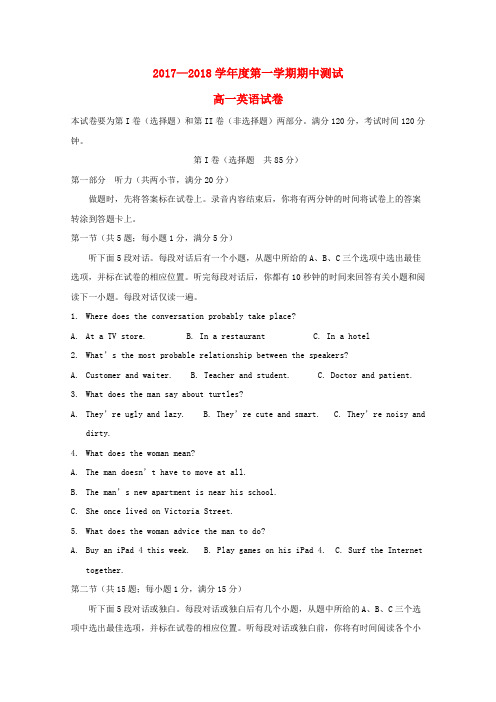
2017—2018学年度第一学期期中测试高一英语试卷本试卷要为第I卷(选择题)和第II卷(非选择题)两部分。
满分120分,考试时间120分钟。
第I卷(选择题共85分)第一部分听力(共两小节,满分20分)做题时,先将答案标在试卷上。
录音内容结束后,你将有两分钟的时间将试卷上的答案转涂到答题卡上。
第一节(共5题;每小题1分,满分5分)听下面5段对话。
每段对话后有一个小题,从题中所给的A、B、C三个选项中选出最佳选项,并标在试卷的相应位置。
听完每段对话后,你都有10秒钟的时间来回答有关小题和阅读下一小题。
每段对话仅读一遍。
1.Where does the conversation probably take place?A.At a TV store.B. In a restaurantC. In a hotel2.What’s the most probable relationship between the speakers?A.Customer and waiter.B. Teacher and student.C. Doctor and patient.3.What does the man say about turtles?A.They’re ugly and lazy.B. They’re cute and smart.C. They’re noisy anddirty.4.What does the woman mean?A.The man doesn’t have to move at all.B.The man’s new apartment is near his school.C.She once lived on Victoria Street.5.What does the woman advice the man to do?A.Buy an iPad 4 this week.B. Play games on his iPad 4.C. Surf the Internettogether.第二节(共15题;每小题1分,满分15分)听下面5段对话或独白。
2017-2018学年高一英语上学期期中试题_86
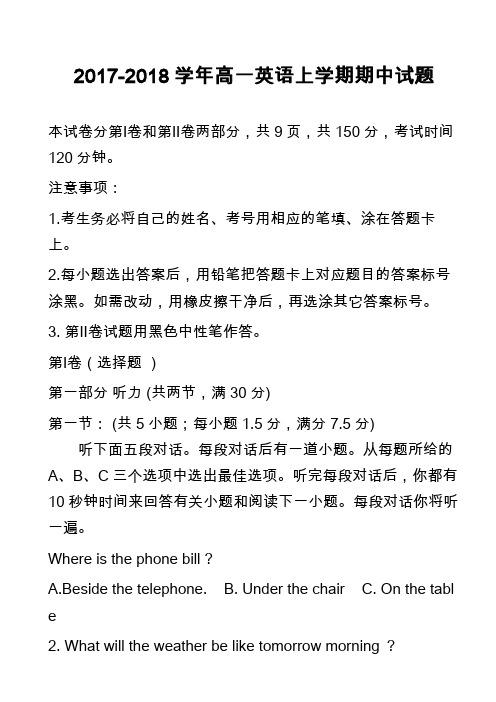
2017-2018学年高一英语上学期期中试题本试卷分第Ⅰ卷和第Ⅱ卷两部分,共9页,共150分,考试时间120分钟。
注意事项:1.考生务必将自己的姓名、考号用相应的笔填、涂在答题卡上。
2.每小题选出答案后,用铅笔把答题卡上对应题目的答案标号涂黑。
如需改动,用橡皮擦干净后,再选涂其它答案标号。
3. 第Ⅱ卷试题用黑色中性笔作答。
第Ⅰ卷(选择题)第一部分听力 (共两节,满30分)第一节: (共5小题;每小题1.5分,满分7.5分)听下面五段对话。
每段对话后有一道小题。
从每题所给的A、B、C三个选项中选出最佳选项。
听完每段对话后,你都有10秒钟时间来回答有关小题和阅读下一小题。
每段对话你将听一遍。
Where is the phone bill ?A.Beside the telephone.B. Under the chairC. On the tabl e2. What will the weather be like tomorrow morning ?A. SunnyB. WindyC. Rainny3. What are the speakers talking about ?A. An actorB. A teacherC. A role4. What did the woman do last night ?A. She went shoppingB. She attended a lectureC. She prepared for an exam5. When will the speakers go to the cinema ?A. On TuesdayB. On WednesdayC. On Thurs day第二节(共15小题;每小题1.5分,满分22. 5分)听下面5段对话或独白。
每段对话或独白后有几个小题,从题中所给的A、B、C三个选项中选出最佳选项,并标在试卷的相应位置。
听每段对话或独白前,你将有时间阅读各个小题,每小题5秒钟;听完后,各小题将给出5秒钟的作答时间。
2017-2018学年高一英语上学期期中试题_16

2017-2018学年高一英语上学期期中试题本试题分第I 卷(选择题)和第II卷(非选择题) 两部分。
全卷共150分,考试时间为120分钟。
第I卷第一部分:听力(共两节,满分30分)第一节(共5小题;每小题1.5分,满分7.5分)请听下面5段对话,选出最佳选项。
How old is the woman?A. 10.B. 18.C. 28.2. What does the man do now?A. An editor.B. A teacher.C. A journalist.3. When will the man go home?A. At noon.B. In the afternoon.C. In the evening.4. What will the speakers do for their mother’s birthday?A. Throw a party.B. Make a dress.C. Buy a gift.5. What are the speakers mainly talking about?A. Their CDs.B. Their hobbies.C. Their stamps.第二节(共15小题;每小题1.5分,满分22.5分)请听下面5段对话或独白,选出最佳选项。
请听第6段材料,回答第6、7题。
6. What will the woman do on Tuesday?A. Visit a farm.B. Have a picnic.C. Go to a villa ge.7. When will the woman go to the island?A. On Monday.B. On Wednesday.C. On Thursd ay.请听第7段材料,回答第8、9题。
8. When will the lecture end?A. At 3:30pm.B. At 4:00pm.C. At 4:30pm.9. What does the man want the woman to do?A. Study with him in the library.B. Help him with the homework.C. Take him to the lecture.请听第8段材料,回答第10至12题。
2017~2018学年第一学期高一年级期中考试英语试题
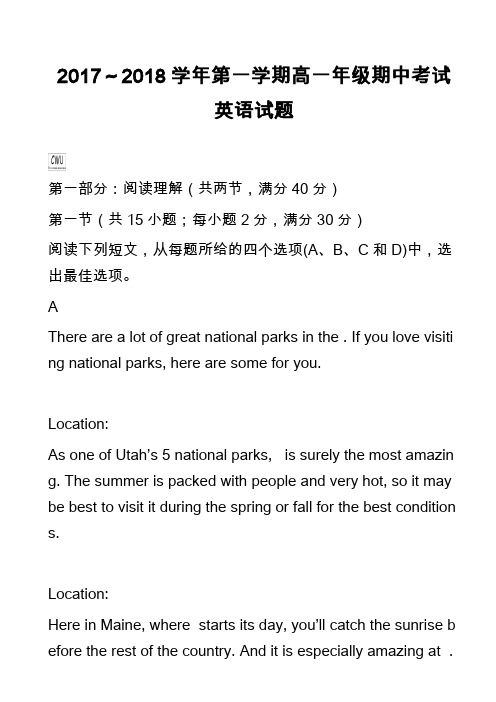
2017~2018学年第一学期高一年级期中考试英语试题第一部分:阅读理解(共两节,满分40分)第一节(共15小题;每小题2分,满分30分)阅读下列短文,从每题所给的四个选项(A、B、C和D)中,选出最佳选项。
AThere are a lot of great national parks in the . If you love visiti ng national parks, here are some for you.Location:As one of Utah’s 5 national parks, is surely the most amazin g. The summer is packed with people and very hot, so it may be best to visit it during the spring or fall for the best condition s.Location:Here in Maine, where starts its day, you’ll catch the sunrise b efore the rest of the country. And it is especially amazing at .Here you’ll able to explore(探索) wonderful mountains and lakes.Location:Escape the busy city life and have some exciting experiences right at . After a quick drive from Washington D.C., you’ll find some of the most well-known scenery(景色) in the country.Location:Just a stone’s throw away from Jackson, WY, lies . , , is one of American’s best towns for outdoor sport. Named for the Gr and Teton, the park is full of surprises.1. If you want to enjoy the beautiful sunrise, you’d go to _____ _____.A.B.C.D. Grand Teton National Park2. What can we learn about Shenandoah National Park?A. It’s famous for its scenery.B. It has many mountains and lakes.C. It’s the best place for outdoor sport.D. It’s’s most beautiful national park.3. The passage is meant to____________.A. compare some national parks in the .B. tell about some activities at national parks.C. introduce some great American national parks.D. explain why American national parks are amazing.BSpaghetti with meatballs(意大利肉丸面) is the food I like best. It tastes good. And reading is the ho bby I like best. , however, can be dangerous. When you are lo st in a book, you stop paying attention to what’s going on arou nd you. It’s a wonderful feeling, but it sometimes can be hazar dous. []When I was young, one day, I was eating spaghetti with meat balls, and I was reading an interesting book. At the time, my f amily had a pet bird named Luke. He was free to fly around in side the house. And Luke enjoyed “talking” to people.As I was reading and eating, Luke was “talking” to me, but I w as lost in my book. So Luke decided to get closer. He suddenl y landed on top of my spaghetti! I shooed him off my food. This wouldn’t have been so bad except for one thing: When Luke had landed on my plate, he had grabbed(抓) my spaghetti with his feet. So when Luke took off again, the spaghetti went flying everywhere. It landed on my shirt. It hit me in the face. Red sauce splattered(溅) up the wall and onto the ceiling. See how dangerous reading can be. If you really like to read while you eat, you must keep one eye on your food. But you’d better eat up your food and then read your book. Why? If you find a novel at the library with red spots on two pages, you’ll k now that I’ve read that book.4. What does the underlined word “hazardous” in Paragraph 1 mean?A. excitingB. strangeC. dangerousD. special5. What did Luke do when the author was reading and eating ?A. It made a mess in the room.B. It learned to talk to the author.C. It took away the author’s book.D. It ate all the spaghetti with meatballs.6. What does the author advise readers to do?A. Keep pets in the house all the time.B. Take good care of pets when you eat.C. Enjoy your book after finishing your eating.D. Spend more time reading books in the library.7. What’s the author’s purpose of writing this text?A. To introduce a delicious food.B. To tell an interesting experience.C. To suggest ways to choose books.D. To show reading is a wonderful thing.CBeing an astronaut(宇航员) sounds cool, doesn’t it? In space, they can float(漂浮) in zero gravity. However, there are also plenty of things th at astronauts can’t do because of their weightless environmen t, and that’s very sad. What’s worse, they can’t even let their s adness show— because it’s impossible to cry in zero gravity. Of course, astronauts can still produce tears. But without grav ity, tears don’t flow downward out of the eyes. This means tha t when you cry in space, your tears have nowhere to go— the y just stick to your eyes which can cause physical pain. Back on Earth, tears usually bring comfort to the eyes. But that’s no t the case in space. The space environment dries out astrona uts’ eyes, and when tears suddenly wet the eyes, it can cause pain rather than comfort.Since gravity doesn’t work in space, astronauts need some extra help to get rid of the tears. They can also rub(擦) his eyes t o wipe the tears away. Another choice is to just wait—when the tears get big enough they simply break free of the e ye and float around.There are lots of small things that we are so used to on Earth. We usually take them for granted, until they become a proble m in a totally different environment, like space. There, astrona uts can’t talk to each other directly. They also can’t eat or drin k in normal ways. They can’t even burp(打嗝), because there is no gravity to hold the food down in their stomach. If they do burp, they just end up throwing up(呕吐) everything in their stomach.Thus, perhaps it’s only space explorers who can honestly say,“Gravity,you’re the best.”8. What bad effect do tears have on astronauts?A. They cause physical pain.B. They bring comfort to them.C. They help them get better sight.D. They float around and cause trouble.9. What can the astronaut do to get rid of the tears?A. Close their eyes.B. Wait till tears flow down.C. Let the tears dry up.D. Wait till the tears get big enough.10. What’s the second-to-last paragraph mainly about?A. Suggestions on how astronauts can stay comfortable in s pace.B. Other basic things that are difficult to do in space.C. The environment in space is totally different.D. Why burping is impossible in space.11. Which of the following can be the best title for the text?A. What can you do in space?B. Better life with gravity.C. In the sky, you can’t cry.D. No gravity, no tears.DA group of homeless children in the Indian capital of publis h a newspaper telling about their own lives. It is called Balakn ama, which means “children’s voice”. It is written and edited (编辑) by children up to 19 years old. About 10, 000 people read it.A homeless girl named Shanno helps edit the paper. She said,” When reports arrive and the team sits down to choose th e story, lots of fights break out. They argue, ‘This story is mor e important than that one.’ So there’s a lot of discussion befor e the final selection(挑选) goes to print.”The newspaper has 70 reporters in several states and 14 in the capital. All of the reporters, editors and managers are ho meless children. Jyoti Kumari is one of the reporters. “I used t o beg. Then I learned about Balaknama and began to work fo r it. First, I was a junior reporter and then a reporter.” Jyoti Ku mari and other children can earn some money now, and many of them attend classes online that may help them find a job. The newspaper is published every month. It has eight page s. In 2002, when it began operations, the newspaper was publ ished four times a year. It has changed the lives of many child ren who publish it, and hopes to improve the lives of thousand s of others.Some organizations support the newspaper. Sanjay Gupta, a media reporter, leads a group that helps the children and gi ves money to the newspaper.The newspaper only costs about three cents. That is less th an the price of a small cup of tea in . But the small cost gives t he children hope that they will someday have a home and a jo b.12. Shanno’s words tell us __________.A. many special reports arrive every day.B. there are a lot of fights between childrenC. children don’t know how to choose the storyD. children will choose important stories after discussion13. How does the newspaper help the kids working for it?A. By paying them moneyB. By telling about their livesC. By teaching them to find jobs onlineD. By offering different classes to them14. What can we learn about the newspaper?A. It gives homeless children a home.B. It is published four times a year now.C. It was first published by Sanjay Gupta in 2002.D. It is very cheap but encourages homeless children.15. What’s the best title of this passage?A. Homeless children live a hard life in .B. Homeless children in publish newspapers.C. Newspapers change lives of homeless childrenD. Balaknama supports homeless children in .第二节(共5小题;每小题2分,满分10分)根据短文内容,从短文后的选项中选出能填入空白处的最佳选项。
2017-2018学年上学期高一年级英语学科期中考试题
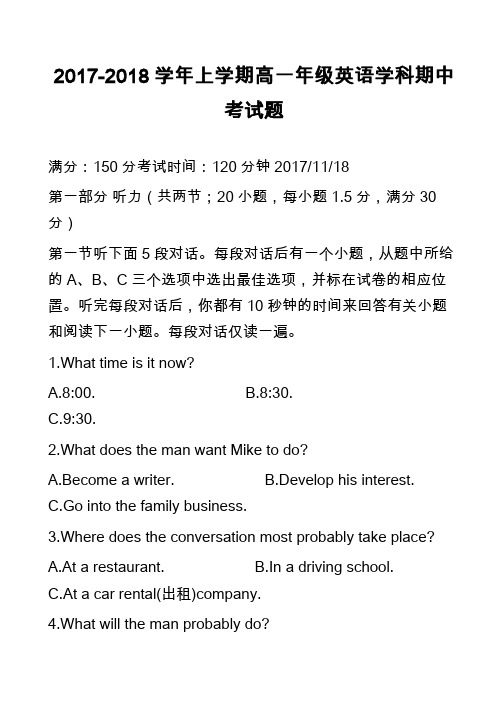
2017-2018学年上学期高一年级英语学科期中考试题满分:150分考试时间:120分钟2017/11/18第一部分听力(共两节;20小题,每小题1.5分,满分30分)第一节听下面5段对话。
每段对话后有一个小题,从题中所给的A、B、C三个选项中选出最佳选项,并标在试卷的相应位置。
听完每段对话后,你都有10秒钟的时间来回答有关小题和阅读下一小题。
每段对话仅读一遍。
1.What time is it now?A.8:00.B.8:30.C.9:30.2.What does the man want Mike to do?A.Become a writer.B.Develop his interest.C.Go into the family business.3.Where does the conversation most probably take place?A.At a restaurant.B.In a driving school.C.At a car rental(出租)company.4.What will the man probably do?A.Pick up his tickets.B.Arrange a meeting.C.Travel to California.5.What is the woman probably going to do?A.Focus on a new topic.B.Type the paper again.C.Rewrite the whole paper.第二节听下面5段对话或独白。
每段对话或独白后有几个小题,从题中所给的A、B、C三个选项中选出最佳选项,并标在试卷的相应位置。
听第6段材料,回答第6、7题。
6.What is the man now?A.A businessman.B.A company clerk(职员).C.A university student.7.What do we know about the man’s uncle?A.He runs a company.B.He has a master degree.C.He is a college professor.听第7段材料,回答第8、9题。
17—18学年上学期高一期中考试英语试题(附答案)
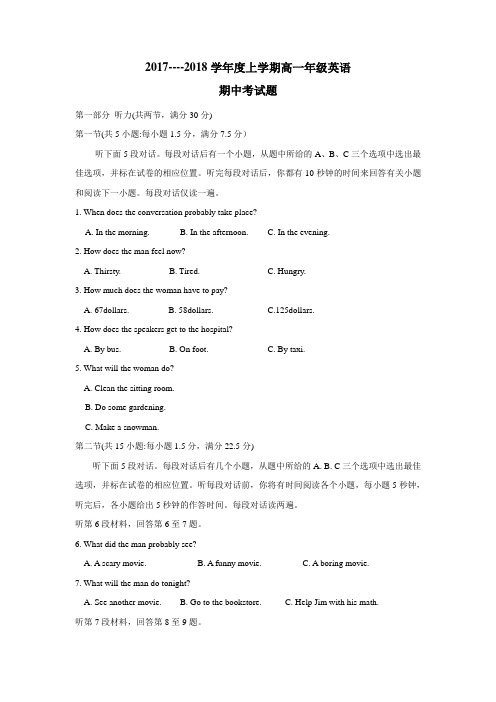
2017----2018学年度上学期高一年级英语期中考试题第一部分听力(共两节,满分30分)第一节(共5小题:每小题1.5分,满分7.5分)听下面5段对话。
每段对话后有一个小题,从题中所给的A、B、C三个选项中选出最佳选项,并标在试卷的相应位置。
听完每段对话后,你都有10秒钟的时间来回答有关小题和阅读下一小题。
每段对话仅读一遍。
1. When does the conversation probably take place?A. In the morning.B. In the afternoon.C. In the evening.2. How does the man feel now?A. Thirsty.B. Tired.C. Hungry.3. How much does the woman have to pay?A. 67dollars.B. 58dollars.C.125dollars.4. How does the speakers get to the hospital?A. By bus.B. On foot.C. By taxi.5. What will the woman do?A. Clean the sitting room.B. Do some gardening.C. Make a snowman.第二节(共15小题:每小题1.5分,满分22.5分)听下面5段对话。
每段对话后有几个小题,从题中所给的A. B. C三个选项中选出最佳选项,并标在试卷的相应位置。
听每段对话前,你将有时间阅读各个小题,每小题5秒钟,听完后,各小题给出5秒钟的作答时间。
每段对话读两遍。
听第6段材料,回答第6至7题。
6. What did the man probably see?A. A scary movie.B. A funny movie.C. A boring movie.7. What will the man do tonight?A. See another movie.B. Go to the bookstore.C. Help Jim with his math.听第7段材料,回答第8至9题。
2017-2018学年上学期高一年级期中考试英语试卷
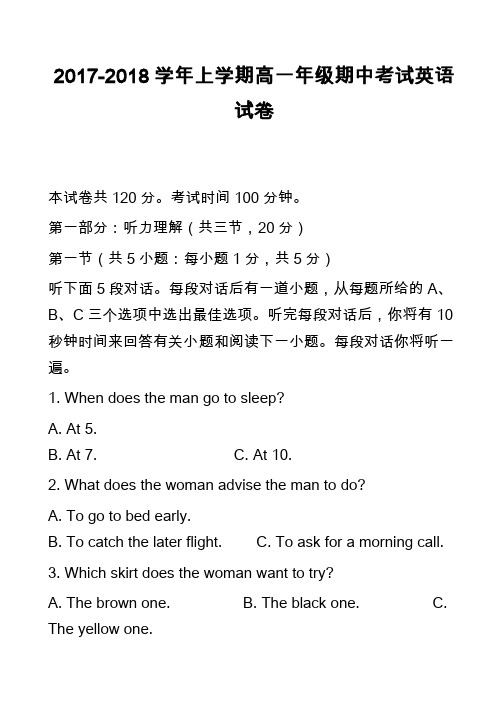
2017-2018学年上学期高一年级期中考试英语试卷本试卷共120分。
考试时间100分钟。
第一部分:听力理解(共三节,20分)第一节(共5小题:每小题1分,共5分)听下面5段对话。
每段对话后有一道小题,从每题所给的A、B、C三个选项中选出最佳选项。
听完每段对话后,你将有10秒钟时间来回答有关小题和阅读下一小题。
每段对话你将听一遍。
1. When does the man go to sleep?A. At 5.B. At 7.C. At 10.2. What does the woman advise the man to do?A. To go to bed early.B. To catch the later flight.C. To ask for a morning call.3. Which skirt does the woman want to try?A. The brown one.B. The black one.C. The yellow one.4. What does Mr. Taylor do?A. A dentist.B. A secretary.C.A clerk.5. Which of the following is Daniel?A. B. C.第二节(共10小题:每小题1分,共10分)听下面4段对话或独白。
每段对话或独白后有几道小题,从每题所给的A、B、C三个选项中选出最佳选项。
每段对话或独白你将听两遍。
听第6段材料,回答第6至7题。
6. What did the man do on the weekend?A. He rested at home.B. He ran in the park.C. He did his homework.7. When did the woman go to the concert?A. On Sunday.B. On Saturday.C. O n Friday.听第7段材料,回答第8至9题。
2017-2018学年高一英语上学期期中试题_66
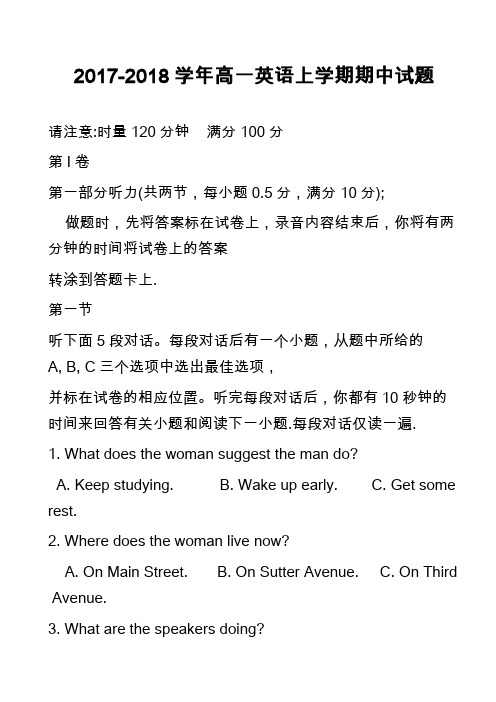
2017-2018学年高一英语上学期期中试题请注意:时量120分钟满分100分第I卷第一部分听力(共两节,每小题0.5分,满分10分);做题时,先将答案标在试卷上,录音内容结束后,你将有两分钟的时间将试卷上的答案转涂到答题卡上.第一节听下面5段对话。
每段对话后有一个小题,从题中所给的A, B, C三个选项中选出最佳选项,并标在试卷的相应位置。
听完每段对话后,你都有10秒钟的时间来回答有关小题和阅读下一小题.每段对话仅读一遍.1. What does the woman suggest the man do?A. Keep studying.B. Wake up early.C. Get some rest.2. Where does the woman live now?A. On Main Street.B. On Sutter Avenue.C. On Third Avenue.3. What are the speakers doing?A. Watching TV.B. Seeing a movie.C. Listening t o the radio.4. What time is it now?A. 4:45 a.m.B. 6:45 a.m.C. 7:00 a.m.5. How does Annabelle know Sara?A. They're in the same science class.B. They're on the same sports team.C. They're working on a project together.第二节听下面5段对话或独白。
每段对话或独白后有几个小题,从题中所给的A,B,C三个选项中选出最佳选项,并标在试卷的相应位置.听每段对话或独白前,你将有时间阅读每个小题,每小题5秒钟:听完后,各小题将给出5秒钟的作答时间。
2017-2018学年高一上学期期中考试英语 试题 word版
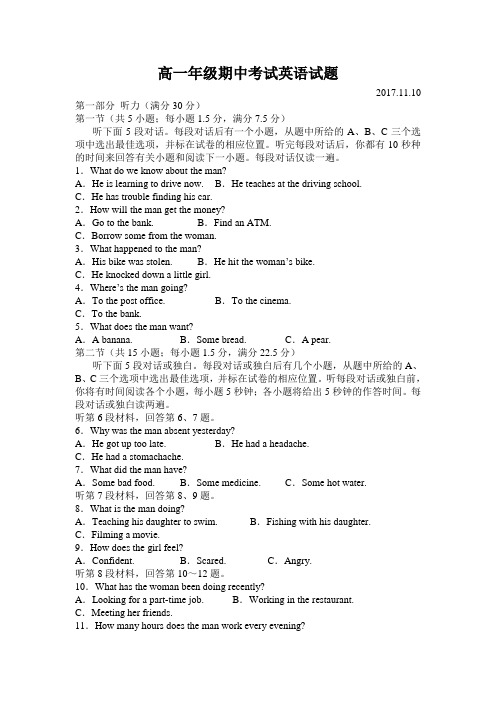
高一年级期中考试英语试题2017.11.10 第一部分听力(满分30分)第一节(共5小题;每小题1.5分,满分7.5分)听下面5段对话。
每段对话后有一个小题,从题中所给的A、B、C三个选项中选出最佳选项,并标在试卷的相应位置。
听完每段对话后,你都有10秒种的时间来回答有关小题和阅读下一小题。
每段对话仅读一遍。
1.What do we know about the man?A.He is learning to drive now. B.He teaches at the driving school.C.He has trouble finding his car.2.How will the man get the money?A.Go to the bank. B.Find an ATM.C.Borrow some from the woman.3.What happened to the man?A.His bike was stolen. B.He hit the woman‟s bike.C.He knocked down a little girl.4.Where‟s the man going?A.To the post office. B.To the cinema.C.To the bank.5.What does the man want?A.A banana. B.Some bread. C.A pear.第二节(共15小题;每小题1.5分,满分22.5分)听下面5段对话或独白。
每段对话或独白后有几个小题,从题中所给的A、B、C三个选项中选出最佳选项,并标在试卷的相应位置。
听每段对话或独白前,你将有时间阅读各个小题,每小题5秒钟;各小题将给出5秒钟的作答时间。
每段对话或独白读两遍。
听第6段材料,回答第6、7题。
6.Why was the man absent yesterday?A.He got up too late. B.He had a headache.C.He had a stomachache.7.What did the man have?A.Some bad food. B.Some medicine. C.Some hot water.听第7段材料,回答第8、9题。
2017-2018学年高一英语上学期期中试题
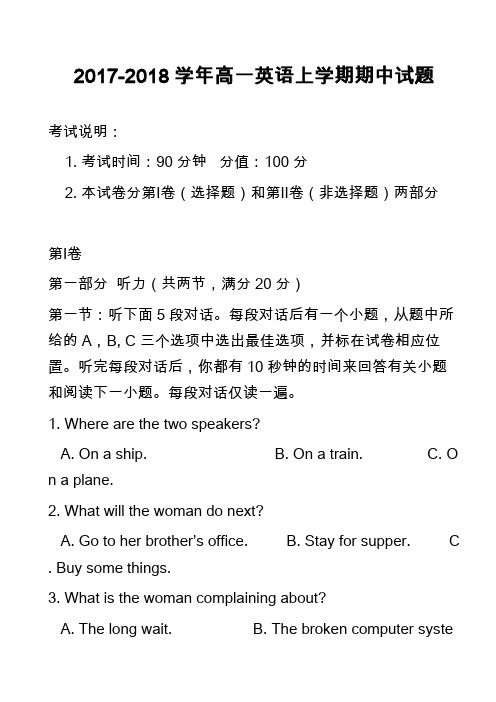
2017-2018学年高一英语上学期期中试题考试说明:1. 考试时间:90分钟分值:100分2. 本试卷分第Ⅰ卷(选择题)和第Ⅱ卷(非选择题)两部分第Ⅰ卷第一部分听力(共两节,满分20分)第一节:听下面5段对话。
每段对话后有一个小题,从题中所给的A,B, C 三个选项中选出最佳选项,并标在试卷相应位置。
听完每段对话后,你都有10秒钟的时间来回答有关小题和阅读下一小题。
每段对话仅读一遍。
1. Where are the two speakers?A. On a ship.B. On a train.C. O n a plane.2. What will the woman do next?A. Go to her brother’s office.B. Stay for supper. C . Buy some things.3. What is the woman complaining about?A. The long wait.B. The broken computer system. C. A mistake in her bill.4. Why did Bill lose his job?A. He was in poor health.B. He made a big error. C . He often went to work late.5. What did the woman do last night?A. She attended a party.B. She did her homework.C. S he went to the cinema.第二节:听下面的5段对话或独白。
每段对话和独白后有几个小题,从题中所给的A, B, C 三个选项中选出最佳选项,并标在试卷的响应位置。
每段对话或独白读两遍。
听第6段材料,回答第6,7题6. Where does the woman want to go?A. To the public library.B. To the national museum.C. To the department store.7. Which bus goes by the department store?A. No.226 bus.B. No.325 bus.C. No. 105 bus.听第7段材料,回答8, 9题8. What size does the woman want?A. Small.B. Large.C. Medium.9. What color swimsuit does the woman take?A. Green.B. Blue.C. Yellow.听第8段材料,回答10至12题10. Why does the woman refuse to go to the cinema?A. She dislikes seeing films.B. She wants to watch football.C. There have not been any interesting films recently.1l. What are the two speakers going to do tomorrow?A. Visit an exhibition.B. Go to a pop concert.C. Go hiking.12. What does the man like?A. Hiking.B. Sailing.C. Climbi ng.听第9段材料,回答13至16题13. What’s the probable relationship between the two speaker s?A. Brother and sister.B. Manager and assistant.C. Customer and salesman.14. What’s wrong with the MP5 player?A. The screen is broken and not clear.B. It doesn’t play songs.C. It has been dropped and no longer works.15. What does the man ask the woman to show him?A. The receipt.B. The package.C. Her telephone number.16. When will the woman get her MP5 player back?A. In three weeks.B. In two weeks.C. In o ne week.听第10段材料,回答第17至20题17. What did the man do in China?A. He worked in a school.B. He drove a taxi.C. He ran a pub.18. How did the man lose his wallet in the taxi?A. He left in a hurry and left his wallet in the taxi.B. He drank too much and left it on the seat.C. He didn’t notice when it slipped out of his pocket.19. What does the man think of Chinese people?A. Hardworking.B. Honest.C. Smart.20. How did the shop owner return the wallet to the man?A. She mailed it to the man.B. She gave it to a policeman.C. She asked the man’s friend to pass it to him.第二部分阅读理解第一节:(共15小题,每小题2分,满分30分)A“Cool” can be used to express feelings of interest in almost an ything.When you see a famous car in the street,maybe you will say,“It's cool.” You may think,“He's so cool.” when you see your favourite footballer.We all maximize(扩大) the meaning of “cool”.You can use it instead of many w ords such as “new” or “surprising”.Here's an interesting story we can use to show the way the word is used.A teacher ask ed her students to write about the waterfall(瀑布)they had visited.On one student's paper was just one senten ce,“It's so cool.” Maybe he thought it was the best way to show w hat he saw and felt.But the story also shows a scarcity(缺乏)of words.Without “cool”,some people have no words to show the same meaning.So i t is quite important to keep some credibility(可信性).Can you think of many other words that make your life as colourful as the word “cool”? I can.And I think they are also very cool.21.We know that the word "cool" has had ________. A.only one meaning B.no meanings C.many different meanings D.the same meaning22.If you are _______ something,you may say,“It’s cool.”A.interested in B.angry about C.afraid of D.unhapp y with23.The writer takes an example to show he is ________ the way the word is used.A.pleased with B.strange to C.worried about D.car eful with24.In the passage,the writer suggests(暗示)that the word “cool”________.A.can be used instead of many wordsB.usually means so mething interestingC.can make your life colourfulD.may not be as cool as it seemsBLouis Armstrong had two famous nicknames. Some people ca lled him Bagamo.They said his mouth looked like a large ba g.Musicians often called him Pops, as a sign of respect for his influence on the world of music.Born in 1901 in New Orleans, he grew up poor, but lived amo ng great musicians.Jazz was invented in the city a few years before his birth.Armstrong often said, “Jazz and I grew up t ogether.” Armstrong showed a great talent for music when he was taught to play the cornet (短号) at a boy’s home.In his late teens, Armstrong began to li ve the life of a musician.He played in parades, clubs, and on the steamboats that traveled on the Mississippi River.At tha t time, New Orleans was famous for the new music of jazz an d was home to many great musicians.Armstrong learned fro m the older musicians and soon became respected as their e qual.In 1922 he went to Chicago.There, the tale of Louis Armstro ng begins.From then until the end of his life, Armstrong was celebrated and loved wherever he went.Armstrong had no e qual when it came to playing the American popular song.His cornet playing had a deep humanity (仁爱) and warmth that caused many listeners to say, “Listenin g to Pops just makes you feel good all over.” He was the fathe r of the jazz style and also one of the best-known and most admired people in the world.His death, on July 6,1971, was headline news around the world.25.Armstrong was called Pops because he ______. A.looked like a musician B.was a musician of much influenceC.showed an interest in music D.traveled to pl ay modern music26.Which statement about Armstrong is true?A.His tale begins in . B.He was born before jazz was invented.C.His music was popular with his listeners. D.He learn ed popular music at a boy’s home.27.Which would be the best title for the text?A.The Invention of the Jazz Music B.The Father o f the Jazz StyleC.The Making of a Musician D.The Spread of Popular MuCis a popular tourist place, but tours of the country have pros a nd cons.GOOD NEWSFree museums. No charge for outstanding collections of art a nd antiquities.Pop music. Britain is the only country to compete with the on this score.Black cabs. taxi drivers know where they are going even if th ere are never enough of them at weekends or night.Choice of food. Visitors can find everything from Japanese to Swedish restaurants.Fashion. Not only do fashion junkies love deeply and respect highly brand names such as Vivienne Westwood, Alexander McQueen; street styles are justly loved, too.BAD NEWSPoor service. “It’s part of the image of the place. People can d ine out on the rudeness they have experienced,” says Profess or Tony Seaton, of Luton University’s .Poor public transport. Trains and buses are promised to disap point the keenest tourists, although the over crowded tube is unbelievably popular.Rain. Still in the number one complaint.No air-conditioning. So that even splendidly hot summers become as unbearable as the downpours.Overpriced hotels. The only European country with a higher r ate of tax on hotel rooms is .Licensing hours. Alcohol(酒) is in short supply after 11 pm eve n in “24-hour cities”.28. What do tourists complain most?A. Poor service.B. Poor public transport.C. Rain.D. Overpriced hotels.29. What do we learn about pop music in Britain and the thro ugh this passage?A. Pop music in Britain is better than that in the .B. Pop music in Britain is as good as that in the .C. Pop music in Britain is worse than that in the .D. Pop music in Britain is quite different from that in the .30. When is alcohol unlikely to be available (可获得的)in quantities?A. At 8: 30 pm.B. At 9: 30 pm.C. At 10: 30 pm. D. At 11: 30 pm.31. Which of the following is true according to the passage?A. The public transport is poor there.B. It’s very cheap to travel by taxi there.C. You cannot find Chinese food there.D. You hav e to pay to visit the museums.DSelf-esteem(自尊心)is all about how much we feel valued, loved, accepted, and thought well of by others and how much we value, love, and accept ourselves. People with healthy self-esteem are able to do better in school and find it easier to ma ke friends. They tend to have better relationships with others, feel happier, find it easier to deal with mistakes and failures, a nd are more likely to stick to something until they succeed. Pe ople with low self-esteem may feel as if no one will like them or accept them or t hat they can’t do well in anything.The following ways may help you improve your self-esteem. Try to stop thinking negative thoughts about yourself. If you’re used to focusing on your shortcomings, start thinking about p ositive aspects of yourself that outweigh them. It is good to ai m high, but your goals for yourself should be within reach. Th at’s why you should set practical goals and never expect the i mpossible. Mistakes are part of learning, so view mistakes as learning opportunities. Accept that you make mistakes becaus e everyone does. Also, you should recognize what you can’t. If you realize that you’re unhappy with something about yourse lf that you can change, start today. If it’s something you can’t change (like your height), start to work toward loving yourself t he way you are. Feeling like you’re making a difference and th at your help is valued can do wonders to improve your self-esteem. So don’t hesitate to make a contribution. You can len d a hand to a classmate who’s having trouble, help clean up o ur neighborhood, or volunteer to do some other things.Self-esteem plays a role in almost everything you do. It’s never too late to build healthy, positive self-esteem. It takes some work, but it’s a skill you’ll have for life.32. The underlined word “them” in Paragraph 3 refers to ____ ___.A. your classmatesB. your shortcomingsC. your strong p ointsD. your goals33. According to the passage, which of the following can help improve your self-esteem?A. Setting high goals similar to others’B. Never forgiving y ourself for your mistakesC. Lending a hand to a classmate in troubleD. Changing all t he things that make you unhappy34. We can infer from the passage that _____.A. the old tend to have healthier self-esteem than the youngB. we should build healthy, positive self-esteem when youngC. there are more people with low self-esteemD. it is not easy to build healthy self-esteem35. The passage is mainly about _____.A. how people improve their self-esteemB. what self-esteem meansC. what people with low self-esteem are like D. what people with healthy self-esteem are like第二节 (共5小题;每小题2分,满分10分)根据短文内容,从短文后的选项中选出能填入空白处的最佳选项。
2017-2018学年高一英语上学期期中试题_33
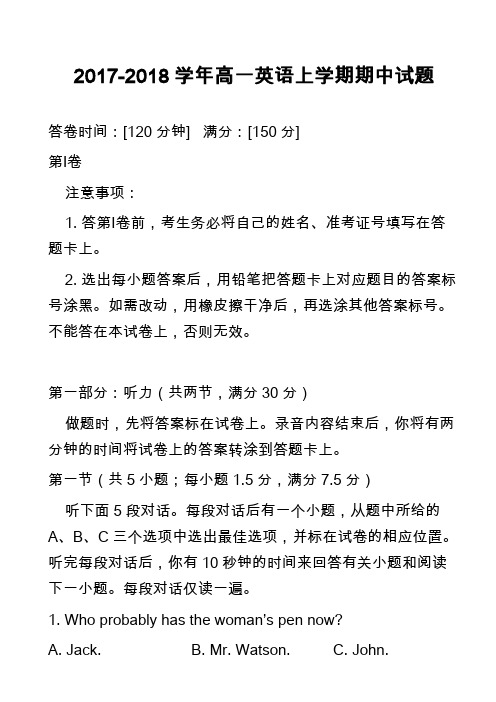
2017-2018学年高一英语上学期期中试题答卷时间:[120分钟] 满分:[150分]第Ⅰ卷注意事项:1. 答第Ⅰ卷前,考生务必将自己的姓名、准考证号填写在答题卡上。
2. 选出每小题答案后,用铅笔把答题卡上对应题目的答案标号涂黑。
如需改动,用橡皮擦干净后,再选涂其他答案标号。
不能答在本试卷上,否则无效。
第一部分:听力(共两节,满分30分)做题时,先将答案标在试卷上。
录音内容结束后,你将有两分钟的时间将试卷上的答案转涂到答题卡上。
第一节(共5小题;每小题1.5分,满分7.5分)听下面5段对话。
每段对话后有一个小题,从题中所给的A、B、C三个选项中选出最佳选项,并标在试卷的相应位置。
听完每段对话后,你有10秒钟的时间来回答有关小题和阅读下一小题。
每段对话仅读一遍。
1. Who probably has the woman’s pen now?A. Jack.B. Mr. Watson.C. John.2. What does the man like doing to relax?A. Watching TV.B. Going walking.C. Listening to music.3. What does the second man mean?A. He is unable to give help.B. He will carry the boxes later.C. He refuses to pay for boxes.4. Where will the woman probably go for her holiday?A. To South America.B. To Europe.C. To Africa .5. What do we know about the man?A. He has difficulty waking up.B. He likes collecting clocks.C. He gets up late every day.第二节(共15小题;每小题1.5分,满分22.5分)听下面5段对话或独白。
2017-2018学年高一英语上学期期中试题_71
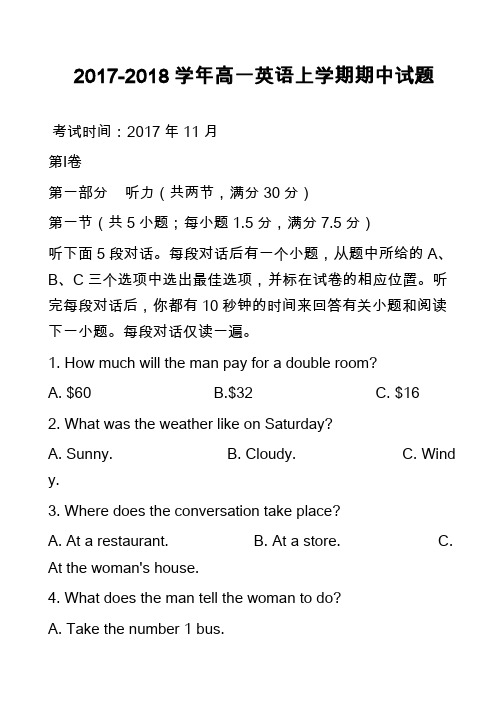
2017-2018学年高一英语上学期期中试题考试时间:2017年11月第Ⅰ卷第一部分听力(共两节,满分30分)第一节(共5小题;每小题1.5分,满分7.5分)听下面5段对话。
每段对话后有一个小题,从题中所给的A、B、C三个选项中选出最佳选项,并标在试卷的相应位置。
听完每段对话后,你都有10秒钟的时间来回答有关小题和阅读下一小题。
每段对话仅读一遍。
1. How much will the man pay for a double room?A. $60B.$32C. $162. What was the weather like on Saturday?A. Sunny.B. Cloudy.C. Wind y.3. Where does the conversation take place?A. At a restaurant.B. At a store.C. At the woman's house.4. What does the man tell the woman to do?A. Take the number 1 bus.B. Go to Linden street on foot.C. Walk to the underground station.5. What are the speakers talking about?A. A class.B. A trip.C. A city .第二节(共15小题;每小题1.5分,满分22.5分)听下面5段对话或独白。
每段对话或独白后有几个小题,从题中所给的A、B、C三个选项中选出最佳选项,并标在试卷的相应位置。
听每段对话或独白前,你将有时间阅读各个小题,每小题5秒钟;听完后,各小题将给出5秒钟的作答时间。
每段对话或独白读两遍。
6. Where are the speakers now?A. In Vancauver.B. In San Francisco.C. In Seattle.7. What is the man?A. A student.B. A teacher.C. A travel agent.听第7段材料,回答第8至9题。
2017-2018学年高一英语上学期期中试题_55
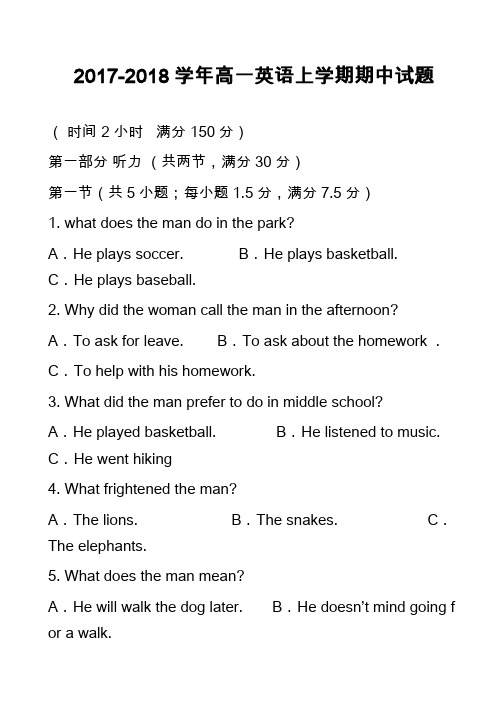
2017-2018学年高一英语上学期期中试题(时间 2小时满分 150分)第一部分听力(共两节,满分30分)第一节(共5小题;每小题1.5分,满分7.5分)1. what does the man do in the park?A.He plays soccer. B.He plays basketball. C.He plays baseball.2. Why did the woman call the man in the afternoon?A.To ask for leave. B.To ask about the homework . C.To help with his homework.3. What did the man prefer to do in middle school?A.He played basketball. B.He listened to music. C.He went hiking4. What frightened the man?A.The lions. B.The snakes. C.The elephants.5. What does the man mean?A.He will walk the dog later. B.He doesn’t mind going f or a walk.C.He is unwilling to walk the dog.第二节(共15小题;每小题1.5分,满分22.5分)听第6段材料,回答第6、7题。
6. What is the rent for a mini car for 3 hours?A.$25. B.$45. C.$60.7. Why can’t the man rent a car?A.He is short of money. B.He is under the age. C.He forgot to bring his driver’s license.听第7段材料,回答第8、9题。
2017-2018学年度第一学期高一期中考试英语试卷
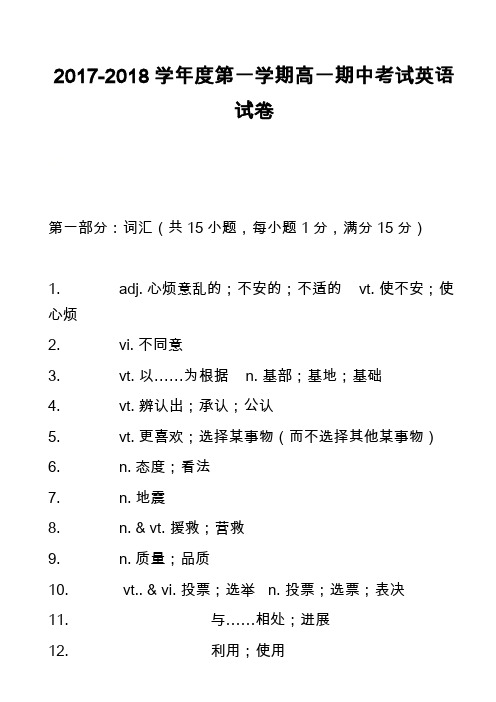
2017-2018学年度第一学期高一期中考试英语试卷第一部分:词汇(共15小题,每小题1分,满分15分)1. adj. 心烦意乱的;不安的;不适的 vt. 使不安;使心烦2. vi. 不同意3. vt. 以……为根据 n. 基部;基地;基础4. vt. 辨认出;承认;公认5. vt. 更喜欢;选择某事物(而不选择其他某事物)6. n. 态度;看法7. n. 地震8. n. & vt. 援救;营救9. n. 质量;品质10. vt.. & vi. 投票;选举 n. 投票;选票;表决11. 与……相处;进展12. 利用;使用13. 改变主意14. 许多;大量15. 失业第二部分:阅读理解(共两节,每小题2分,满分40分)AJohn sent for a doctor because his wife was ill. He called the doctor and made sure they would meet at five. He arrived a t the doctor's at twenty to five. He thought, "It's a little bit earl ier. I'll wait for a moment. It's good to keep the time." Then he stopped his car in front of the doctor's. He looked a round and saw a noisy square(广场)not far from here. He went there and sat down on a chair to enjoy the last light of afternoon sun and make himself quiet.He saw some children playing and some women talking to ea ch other happily.Suddenly he heard a girl crying. He came up to her and asked some questions. Then he knew she got lost. John tried to find o ut her address and took her home. The girl's parents were v ery thankful.Then John hurried to the doctor's. The doctor said angrily when he saw him, "You're late. Why did youkeep me waiting for twenty minutes? " John said nothing but one word—"Sorry! "16.John went to the square to ______.A.spend the time B.enjoy himselfC.see the children and the women D.help the girl 17.The girl cried because ______.A.someone hit her B.she fell off her bike C.her parents were angry with her D.she didn't find t he way home18.At last John got to the doctor's at ______.A.twenty to five B.twenty past five C.five o'clock D.forty past five 19.From the story, we know John is a ______.A.busy person B.quiet person C.helpful person D.lucky personBA big red American car was much too wide for an English cou ntry road. When Jack saw it coming toward him, he stopped his own car at the side of the road to make room for it to past. The American car went slowly past, so close that hecould see the dri ver’s face quite clearly."Where have I seen that face before ?" he thought, “Wait a mi nute! I remember now. It was in the newspaper!" He took out the newspaper from hi s bag, turned quickly to the middle page. There was a picture of the face in it. Yes, it had a large mouth and small ears, and his eyes were behind dark glasses."Wanted by the police," read by Jack. “The City Bank will give a lot of money to anyone who helps the police to catch this m an. ""Call the police at once," he said to himself. But a few minutes later, he was sad. "This man was caught this morning," answ ered the police.20. In which country did the story happen?A. It happened in America.B. It happened in Australia. .C. It happened in England.D. The story did n‘t tell us.21. Why did Jack stop his car?A. He wanted to see who the driver was.B. He didn’t want to pass by first.C. The road was too narrow for the two cars to pass at the same time.D. Because it was good for an Englishman to stop to let other go.22. Who was wanted by the police in this passage?A. Jack.B. The driver in the American car.C. Either Jack or the driver.D. Neither Jack nor the Amer ican driver.23. What did Jack do when he had read the newspaper again ?A. He drove to the City BankB. He drove to the police.C. He made a telephone call.D. He stopped the America n car.24. Who caught the man with a large mouth and small ears?A. The police.B. JackC. Nobody.D. The American driverCIn the early 1990s,the word”Internet” was strange to most pe ople. But today, Internet has become a useful tool for people all over the world. Maybe Internet has been the greatest inven tion in the field of communication in the history of mankind.Communicating with others on the Internet is much faster. We can chat with a person who is sitting in the other part of the w orld. We can e-mail our friends and they can read the e-mails within a minute.Giving all kinds of information is probably the biggest advanta ge of the Internet. We can use search engines(搜索引擎) to find the information we need. Just type in a keyword o r keywords and the search engine will give us a list of suitable websites to look at.We can enjoy a lot on the Internet by downloading games, visi ting chat rooms or surfing (浏览)websites. There are some games for free. We can meet new and interesting people in the chat now. We can also listen to music and see films.Now ,there is a lot of service on the Internet such as online ba nking ,job finding and ticket buying. We can also do shopping and find nearly all kinds of goods. Sometimes we can find so mething that is quite good but very cheap.25. How many main advantages of the Internet are talked abo ut in the passage?A. Three.B. Four.C. Five.D. Six.26. What fact doesn’t the passage provide?A. We can find almost anything we want to know on the Intern et.B. Some games on the Internet are free.C. We can buy most things we need on the Internet.D. Goods on the Internet are more expensive than those in re al shops.27. Which title best gives the main idea of the passage?A. Online ShoppingB. Exchanging Information on the InternetC. The Advantages of the InternetD. Surfing the Websites on the InternetDJoker found one of the biggest diamonds in the world in his own back yard. He sold the stone to a diamond dealer for ov er three hundred thousand dollars. In New York, the diamond was resold---this time for almost eight hundred thousand dollars. The true v alue of a diamond is never known until it has been cut. Once cut successfully, its value can increase a thousand times. It’s easy to understand why the owner of the Joker diamon d went to the best diamond cutter he knew, Kaplan. The cutter studied the diamond for twelve whole months.When he felt he was ready to start work, he discovered a fl aw (瑕疵). He had to begin with his calculations (计算) all ove r again, or he might have made the stone useless. Six more months passed, and Kaplan finally said to the owner, “I am re ady to start my work. There will be one excellent diamond that will be comparable to any in the world, plus eleven small dia monds of first-class quality.” Kaplan waited a few more days until be felt he was in the best physical and mental condition possible. He pic ked up his tools and held his breath as he made the diamond exactly as he promised.28. Joker found one of the biggest diamonds in the world ____ ___.A. in a minuteB. in his own backyardC. at the foot of a big mountainD. in a garage29. A diamond dealer is a person _______,A. who stores diamondsB. in the diamond busin essC. who cuts diamondsD. who sells diamonds30. Kaplan studied the diamond for _______.A. more than nineteen monthsB. more than half a yearC. over eighteen monthsD. more than one and a h alf yearsEW: Hi, John.M: Hi. Lucy. 31W: Yes. I'm required to tell a story in English before the lesso n begins.M: Oh, I see. 32W: You're right. I need to practice on the stage before they all come.M: 33W: Yes, here, in my pocket...Oops, where is it?M: Don't worry, 34W: ...No, not in the bag, either. I'm afraid I left it at home.M: 35W: Aha! It's just the key to the classroom! Thank you so much .A. Do you have the key to the classroom?B. So you want to get to the classroom earlier to make somepreparation?C. What's the story about?D. Glad to see you.E. You're going to school rather early today.F. Maybe you put it in your schoolbag,G. What's that around your neck?第三部分英语知识运用(共两节,满分30分)第一节完型填空(共20小题;每小题1分,满分20分)As a teenager, I felt I was always letting people down. I was rebellious (反叛的) on the outside, 36 on the inside, I wanted people to 37 me.Once I left home to hitchhike (搭便车) to California with my friend Penelope. The trip wasn’t 38 , and there were many times I did n’t feel safe. One situation in particular 39 me grateful to still be alive. When I returned h ome, I was different, not so outwardly sure of myself.I was happy to be home. But then I noticed that Penelope, wh o was 40 with us, was wearing my clothes. And my 41 se emed to like her better than me. I wondered if I would be 42 if I weren’t there. I told my mom, and she explained that 43Penelope was a lovely girl, no one could 44 me. I pointed out, “ She is more patient and is neater than I have ever been.” My mom said these were wonderful 45 , but I was the only person who could fill my 46 . She made me realize that eve n with my 47 — and there were many —I was a loved member of the family who couldn’t be replaced.I became a searcher, wanting to 48 who I was and what ma de me unique (独一无二的). My 49 of myself was changing. I wanted a solid base to st art from.. I started to resist (抵抗) pressure to 50 in ways that I didn’t like any more, and I was 51 by whom I really was. I came to feel much more 5 2 that no one can ever take my place.Each of us 53 a unique (独一无二的) place in the world.You are special, no matter what other s say or what you may think. So 54 about being replaced.You 55 be.36. A. and B. but C. asD. for37. A. leave B. respectC. admireD. like38. A. easy B. hard C. funD. long39. A. succeeded B. keptC. managedD. remained40. A. playing B. eatingC. stayingD. running41. A. family B. friendsC. relativesD. class42. A. loved B. mentioned C. caredD. missed43. A. before B. after C. thoughD. unless44. A. scold B. compare C. replaceD. match45. A. qualities B. girls C. peopleD. times46. A. character B. role C. taskD. job47. A. faults B. advantagesC. mannersD. pities48. A. look for B. look backC. find outD. give up49. A. picture B. view C. senseD. drawing50. A. think B. learn C. changeD. act51. A. thankful B. delightedC. disappointedD. hopeful52. A. sure B. doubtful C. happyD. lonely53. A. carries B. catches C. seizesD. holds54. A. talk B. forget C. careD. argue55. A. mustn’t B. shouldn’t C. can’tD. needn’t第二节语法填空(共10小题,每小题1分,满分10分)My name is Wang Kun. Since middle school, my sister and I 56 (dream) about 57 (take)a great bike trip. When we gra duated from college, we finally got the chance to do it. It 58 my sister 59 first had the idea to cycle along 60 Mekong R iver from 61 it begins to where it ends. The Dai live near t he Lancang River, the Chinese part of the river that 62 (ca ll) the Mekong River in other countries. Wang Wei soon got them interested in cycling too. She insisted that she 63 (org anize) the trip properly. She gave me a 64 (determine) look . Once She has made up her mind, nothing can change it. Fin ally, I had to give 65 .第四部分写作(共两节,满分35分)第一节短文改错(共10小题;每小题1分,满分10分)注意:1.每处错误及其修改均仅限一词;2.只允许修改10处,多者(从第11处起)不计分。
广西南宁市20172018学高中高一英语上学期期中试卷试题
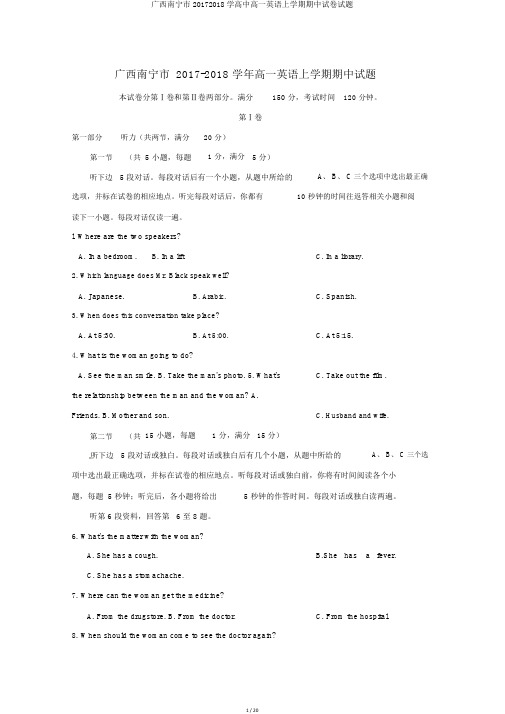
广西南宁市 2017-2018 学年高一英语上学期期中试题本试卷分第Ⅰ卷和第Ⅱ卷两部分。
满分150 分,考试时间120 分钟。
第Ⅰ卷第一部分听力(共两节,满分20 分)第一节(共5 小题,每题 1 分,满分 5 分)听下边 5 段对话。
每段对话后有一个小题,从题中所给的A、 B、 C 三个选项中选出最正确选项,并标在试卷的相应地点。
听完每段对话后,你都有10 秒钟的时间往返答相关小题和阅读下一小题。
每段对话仅读一遍。
l. Where are the two speakers?A. In a bedroom.B. In a lift.2. Which language does Mr. Black speak well?A. Japanese.B. Arabic.C. In a library.C. Spanish.3. When does this conversation take place?A. At 5:30.B. At 5:00.C. At 5:15.4. What is the woman going to do?A. See the man smile.B. Take the man's photo. 5. What's the relationship between the man and the woman? A. Friends. B. Mother and son.C. Take out the film.C. Husband and wife.第二节(共15 小题,每题 1 分,满分15 分)听下边 5 段对话或独白。
每段对话或独白后有几个小题,从题中所给的A、 B、 C 三个选项中选出最正确选项,并标在试卷的相应地点。
听每段对话或独白前,你将有时间阅读各个小题,每题 5 秒钟;听完后,各小题将给出 5 秒钟的作答时间。
每段对话或独白读两遍。
听第 6 段资料,回答第 6 至 8 题。
- 1、下载文档前请自行甄别文档内容的完整性,平台不提供额外的编辑、内容补充、找答案等附加服务。
- 2、"仅部分预览"的文档,不可在线预览部分如存在完整性等问题,可反馈申请退款(可完整预览的文档不适用该条件!)。
- 3、如文档侵犯您的权益,请联系客服反馈,我们会尽快为您处理(人工客服工作时间:9:00-18:30)。
2017~2018 学年度秋季学期期中考试试卷(高一英语)全卷满分150分,考试时间120分钟注意事项:1.本试卷由四个部分组成。
其中,第一、二部分和第三部分的第一节为选择题。
第三部分的第二节和第四部分为非选择题。
2.答卷前,考生务必将自己的姓名、准考证号填写在答题卡上。
3.回答选择题时,选出每小题答案后,用2B铅笔把答题卡上对应题目的答案标号涂黑;回答非选择题时,将答案写在答题卡上,写在本试卷上无效。
4.考试结束后,将本试卷和答题卡一并交回。
第一部分:听力(共两节,满分30分)第一节(共5 小题;每小题1.5 分,满分7.5 分)听下面 5 段对话。
每段对话后有一个小题,从题中所给的A、B、C三个选项中选出最佳选项,并标在试卷的相应位置。
听完每段对话后,你都有10 称钟的时间来回答有关小题和阅读下一小题。
每段对话仅读一遍。
1. How does theman feelabout themovie?A. Heonlylikes its story.B. Helikes it verymuch.C. Hedoesn’t likeit at all.2. What will theman do with his old computer?A. Sell it to thewoman.B. Giveit to his brother.C. Keep it himself.3. What’s theprobablerelationship between thetwo speakers?A. Mother and son.B. Brotherand sister.C. Teacher and student.4. What does theman eatat last?A. An apple.B. A banana.C. A pear.5. Whereis theman’s father?A.In thestudy.B.In thegarage(车库).C.In his room.第二节(共15 小题;每小题1.5 分,满分22.5 分)听下面5段对话或独白。
每段对话或独白后有几个小题,从题中所给的A、B、C 三个选项中选出最佳选项,并标在试卷的相应位置。
听每段对话或独白前,你将有时间阅读各个小题,每小题5秒钟;听完后,各小题将给出5秒钟的作答时间。
每段对话或独白读两遍。
请听第6 段材料,回答第6、7 题。
6. Whereis thelibrary?A. Behind thenew playground.B.In front ofthenew playground.C. Behind thenew teachingbuilding.7. What do weknow about Ann?A. Shedoesn’t likeswimming.B. Shehas acolorful collegelife.C. Sheworks reallyhardin college.请听第7 段材料,回答第8、9 题。
8. How longdid themanplayfootball this afternoon?A. Threehours.B. Fourhours.C. Fivehours.9. Whydidn’t themango fordinnerwith his friends?A. Becausehestill wanted to play.B. Becausehewas not hungry.C. Becausehewas too tired.请听第8 段材料,回答第10 至12 题。
10. How was theweatheryesterday?A. Hot.B. Cool.C. Cold.11. What did theman do yesterday?A. Hevisited afriend.B. Hestayed at home.C. Hewent swimmingwith a friend.12. What do weknow about theman?A. Hestill feelsterriblenow. B. Hefeelsveryhungrynow.C. Hehasn’t takenanypillsyet.请听第9 段材料,回答第13 至16 题。
13. When will theman leave forCanada?A. Next Monday.B. This Sunday.C. This Saturday.14. What’s theman worried about?A. How to makesomefriends.B. How togetalong well with others.C. How to makeothers understand him.15. What does thewoman think oftheman?A. Hard working.B. Easy-going.C. Outgoing.16. What do weknow about thewoman?A. Sheis afraid to introduceherselfto others.B. Shetries to rememberotherpeopl e’s names.C. Sheis bad at makingaconversation.请听第10 段材料,回答第17 至20 题。
17. How longhavethespeakerand Josh been friends?A. Overayear.B. About amonth.C. About halfayear.18. What didJosh want to do that day?A. Watch amovie.B. Go back to school.C. Watch his sist er’s performance.19. How did thespeakerfeel when his mothersawhim?A. Excited.B. Sad.C. Nervous.20. What did thespeakerlearn in the end?A. Josh was not agood friend.B. Friends needed timeoftheirown.C. Josh nolongerwantedto behis friend.第二部分:阅读理解(共两节,满分40分)第一节 (共15小题;每小题2分,满分30分)阅读下列短文,从每题所给的四个选项(A、B、C和D)中,选出最佳选项。
AOne day an old woman was traveling alone in the mountains. Suddenly she saw somethingshiningin thestream. When she cameclose, she found it was a precious(珍贵的)stone. Sheput thestoneinto herbagandwent onwith hertrip.Thenextdaytheoldwomanmetayoung man, whowasalsoatravelerinthemountains. Theyoung manlooked veryhungry,sotheoldwomanopenedherbag toshareherfood.The hungry travelersawthepreciousstoneandaskedcarefully,“Thestoneisbeautiful.Would you liketogiveit to me?”“Sure. Whynot?”thewom an said, and handed thestoneto him.Theyoungmanlefthappily withthestone.Heknewitwasworthenoughtogivehim securityforalifetime.Butafewdayslaterhecamebacktoreturnthestonetothewoman.“I’vebeenthinking,”hesaid.“I knowhowvaluablethestoneis,butIgiveitbackand hopethatyoucangivemesomethingevenmoreprecious.Givemewhatyouhavewithin yourbag.”Thewomanopenedherbag.Itwasalmostempty.Shelookedattheyoungmanand smiled, “Ihavenothingspecialinmybag,butIdohavesomethingprecious—thejoyofgiving!”Theyoung man felt ashamed and left silently.21. How did theyoungman find theprecious stone?A. He found it in his food.B. Hesaw it in thewoman’s bag.C. Hedugit out in avalley.D. Henoticed it shiningin thestream.22. What does theunderlined word “security”in Paragraph 4 probablymean?A. Health.B.Worry.C. Money.D. Trouble.23. Theman returned thestoneto thewoman because .A. he found thestonewas not preciousB. heunderstood thereal meaningofjoyC. he felt embarrassed at taking awaythestoneD. hewanted toget somethingeven moreprecious24. Which ofthe followingwould bethebest titleofthepassage?A. A special travelerB. ThejoyofgivingC. A woman and ayoung manD. An experiencein themountainsBAgroupofpeopleaskedthisquestiontoagroupof4-to-8-year-oldchildren.“Whatdoes lovemean?”The answers weresurprising.The children would answerliketheydid below.“Whenmygrandmotherhurtherknees,shecouldn’t bent(弯腰)overandpainthertoenails(脚指甲)anymore.Somygrandfatherdoesitforherallthetime,evenwhenhis hands hurt too.That’s love.”Rebecca–age8 “Loveiswhensomeonehurtsyou.Andyougetsomadbutyoudon’tshoutatthem becauseyou know it would hurt her feelings.”Samantha–age6“Loveis what makesyousmilewhenyou’r etired.”Terri–age4“Ilet mybig sister pickon(捉弄)mebecausemy mumsayssheonlypicksonmebecause sheloves me. SoIpick on mybabysisterbecauseIloveher.”Bethany–age4 “Iknowmyoldersisterlovesmebecauseshegivesmeallheroldclothesandhastogo out and buynew clothes.”Lauren–age4 “Loveis when Mommy gives Daddythebest pieceof chicke n.”Elaine–age5“Mymommylovesmemorethananybody.Youdon’tseeanyoneelsekissingmetosleep at nig ht.”Clear–age5 “Youreallyshouldn’tsay‘Ilovey ou’unl essyoumeanit.Butifyoumeanit,youshould sayit alot. People forget.”Jessica–age825.Thepassagemainlytells us about .A. what “life”m eans to childrenB. what“fa mily”m eans to childrenC. what “fr iends”m eansto childrenD. what “love”m eans to children26.What is love accordingtoTerri?A.Loveis the carebetween husband and wife.B.Loveis arest whenyou aresad.C.Loveis what cheersyou up whenyou aretired.D.Loveis akiss from parents.27.Who told us thelovebetween mum and dad?A. Clear.B. Elaine.C. Rebecca.uren.28.What does Jessicamean about love?A.Too much loveis no love.B.You should saylovemoreoften.C.You mean whatyou think.D. Saylovemoreoften ifyou haveit.CHaveyou everbeen toLondon?Hereis somehotel information foryou.Kingsway Hall HotelWeoffer qualityservice(优质服务)inKingsway HallHotel.Thislocationputsguests ineasy reachofmany places,suchastheBritishMuseumandPiccadillyCircus.Ourhotel alsohasmodernWesternfood,andoffersaperfectdining environment.Theloungebarisa comfortableplacetoenjoy adrinkwhilewatchingthetourists.Therearehundredsofdining choices within walkingdistance. Non-smokingrooms are readyforguests.HiltonDocklands RiversideLocatedonthe bankof the Thames,our hotelisabouttwomileseastof Tower Bridge and36milesfromLondonHeathrowAirport.Ourhotelhasabeauty salon,aflowershop andaswimming pool. Thehotelalsooffersdifferentkindsofservice:laundry(洗衣店) services, babysitting, shiningshoes, and local areatransportation.WindermereHotelLocatedinthecenterofLondon,ourhotelputsguestswithineasy reachofLondon’s well-knownbuildings. Buckingham Palace andthe Royal Parksare justa shortwalkaway. Within1.5milesyoucanvisitWestminsterAbbey andtheHousesofParliament.The theatres,Harrodsshoppingcentre,andthedesignershopsofSloane Squareand Knightsbridgeareall onlyashort walk awayorataxi ride away.29. What does KingswayHall Hotel provide forits guests?A. Chinese food.B. A loungebar.C. Smokingrooms.D. Aswimmingpool.30. What is special about Hilton Docklands Riverside?A.It offers different kinds ofservice.B.It offers areasonableprice.C.It hasconvenient transport.D.It has delicious food.31. This passageis most likelyto be found in .A. atravelguideB. astorybookC. atechnical reportD. ageographymagazineDWateris veryimportant to livingthings.Without watertherecan beno lifeon the earth.All animals and plants need water. Man also needswater. Weneed watertodrink, to cookourfoodandtocleanourselves.Waterisneededinoffices,factoriesandschools.Wateris neededeverywhere.Thereiswaterinseas,riversandlakes.Waterisfoundalmost everywhere.Eveninthe desert part oftheworld, thereis somewaterin theair. Youcan’t seeorfeelit when it is apart oftheair.Thewaterintheseas,riversandlakesisaliquid,thewaterintheairisagas,andwe call it watervapor (蒸汽).Cloudsaremadeofwater.Theymaybemadeofvery smalldropsof water.Theymay also bemadeofsnowcrystals(结晶体).Snowcrystalsarevery smallcrystalsofice.Iceisfrozen water.It is asolid.Therecan besnowand iceeverywherein winter.Watermaybeasolidoraliquidoragas.Whenitisasolid,itmay beashardasastone. When it is aliquid,you can drink it.When it is agas,youcan not seeorfeel it.32.Where canwe find water?A.We can find waterwhen it turns into vapor.B.Watercan befound almost everywhere.C.We can find waterin deserts here andthere. D.Wateris found onlyin seasandrivers.33. Clouds aremadeof .A. seas, rivers and lakesB. blocks oficeC. solid, liquid and gas34.Waterhas threestates(状态): .D. verysmall drops ofwaterorsnowcrystalsA. ice, snow andairB. solid, vapor, snowC. solid, liquid and gasD. drops ofwater, blocksofice andcrystals ofwater35.We can drink waterwhen it is .A. aliquidB. asolidC. in the airD. turned into ice第二节(共5小题;每小题2分,满分10分)根据短文内容,从短文后的选项中选出能填入空白处的最佳选项。
